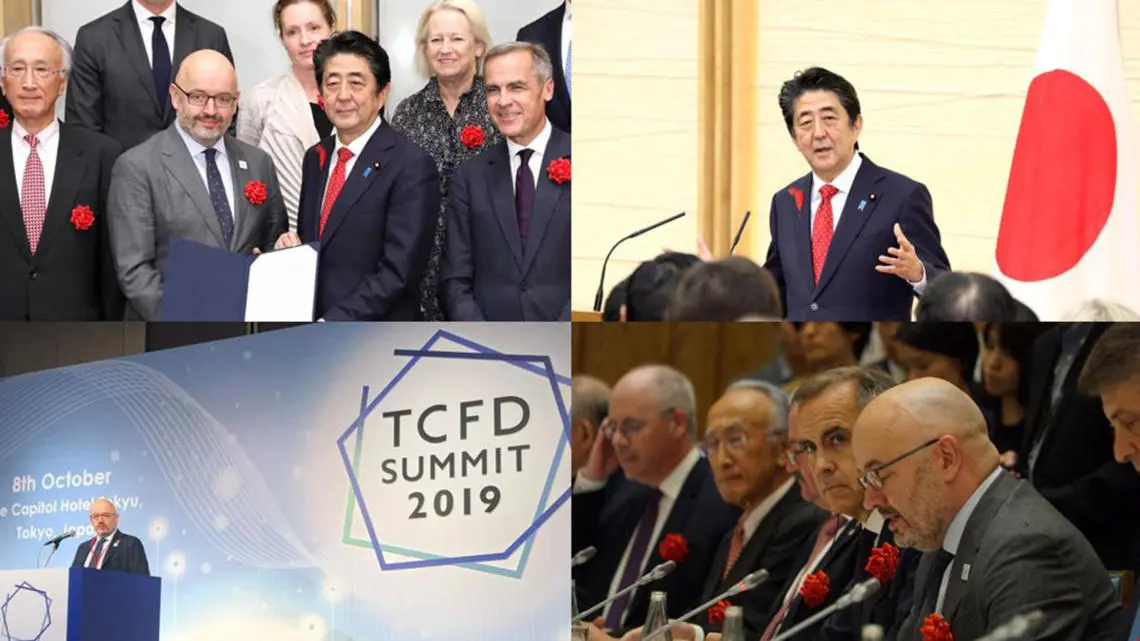Authors
Peter Bakker
Last Tuesday 8 October the first-ever TCFD Summit was held in Tokyo, convening around 300 global attendees from government, business, investors and civil society to advance discussions around corporate disclosure on climate change. WBCSD was invited to co-host this Summit alongside Japan’s Ministry of Economy Trade and Industry (METI) and a newly formed TCFD Consortium of Japan.
Speaking at the conference, Mark Carney, Governor of the Bank of England, gave a keynote address which underlined a strong appetite among investors to support companies that understand their climate risks, and hinted that reporting in line with TCFD recommendations could become mandatory within two years. Mr. Carney noted that of all the frameworks out there, this is the one that is having an impact on investors. A new study by TCFD and PwC has found positive correlation between share price and TCFD disclosure. Globally now more than 880 companies have expressed their support for the TCFD framework; of which 199 from Japan.
The event showcased the leadership position that Japan is taking when it comes to advancing dialogues around the low-carbon transition in its year as G20 hosts. The Japanese government has worked closely with WBCSD to organize this TCFD Summit, which formed part or a broader suite of summits taking part in Tokyo during the same week, which also focused on advancing research and development for critical low carbon solutions (RD20) and enhancing technologies to tackle climate change (ICEF).
The Japanese Prime Minister Shinzo Abe displayed personal leadership by inviting representatives from each of these summits to gather for a specially convened Green Innovation Summit at his offices to discuss some of the key topics emerging from each of the respective events.
I had the opportunity to deliver a brief statement to the Prime Minister, summarizing the key takeaways from the TCFD Summit. My key concluding point: the challenges that lay ahead of us in transitioning towards a low-carbon society are considerable, but so too are the opportunities for innovation and business leadership.
By co-hosting the TCFD Summit, WBCSD represented the voice of leading businesses on this crucial topic to accelerate the transition to a world in which more sustainable companies are more successful.
The leadership role that both the Japanese government and the business community have embraced in recent years when it comes to the implementation of critical frameworks such as the Sustainable Development Goals and the TCFD has set a high bar for the rest of the world and we look forward to providing a showcase for this leadership to WBCSD’s wider community in 2020 when the Council Meeting takes place in Tokyo. It will be of great value for WBCSD’s members to gain exposure to: insights emerging from the 2020 Olympics, which look set to be one of the most sustainable and inclusive games yet; perspectives from Japan’s financial community who continue to embrace the integration of ESG; the Keidanren’s efforts to leverage the technological prowess of Japanese business to contribute to the realization of the SDG agenda; and the government’s continued efforts to advance the TCFD guidelines.
The 2020 Council Meeting will also be a landmark for WBCSD as it will be taking place in the year of our 25th anniversary and will also see the launch of our Vision 2050 Refresh work, on which we remain grateful for our members’ leadership and guidance.
We’re now looking forward to our Council Meeting in Lisbon next week which will provide an excellent platform to work with our members and partners to lead, transform and succeed.
WBCSD news articles and insights may be republished in accordance with the Creative Commons Attribution-NonCommercial-NoDerivatives 4.0 International Public License, and in accordance with our Privacy Policy. All Content must be featured with due credits.

